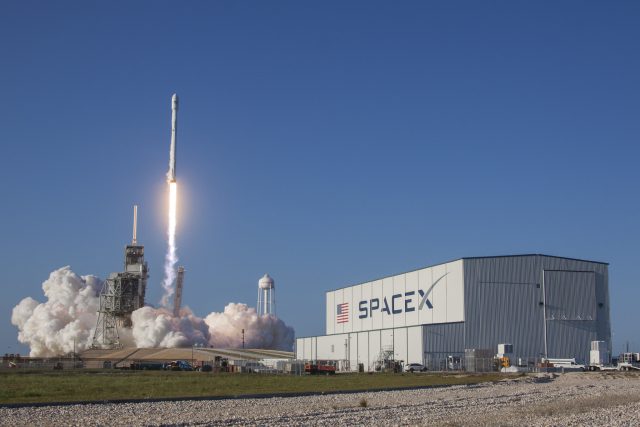
Space fans had a couple of big days last week at the International Astronautical Congress in Adelaide. The government’s announcement of an Australian space agency on the first day of the five-day conference was important enough (my thoughts here). But things really took off on the final day with an address by SpaceX head Elon Musk to 5,000 attendees and many more on the internet.
Musk updated his plan for colonising Mars, originally released at last year’s meeting, and made clear that he has thought more about the economics and how to make the vision practicable and affordable. He’s scaled back his spacecraft, the Interplanetary Transport (IPT), which is to be launched on a large, fully reusable booster called the ‘BFR’ (you can work out the acronym). He’s also broadened its missions beyond simply colonising Mars to include establishing and supporting a lunar base, hauling large cargo into Earth orbit, supporting the International Space Station, and offering rapid intercontinental air travel—anywhere, point to point, in under an hour for the price of an economy-class air ticket. You can find the presentation on the SpaceX website here.
In watching Musk’s presentation, I was far more taken with his decision to support lunar operations with the IPT, and his recognition of the BFR’s potential for transforming the launching of payloads into Earth orbit, than I was about Mars bases. Musk admits that timelines of the mid-2020s for Mars landings are very aspirational, but the BFR has more immediate commercial and defence implications that need to be considered.
In the presentation, Musk made clear that the BFR can send 150 tons to low-Earth orbit (LEO), making it more capable than an Apollo-era Saturn V (135 tons). Given its full reusability, Musk argues that it also comes out as the cheapest way to get payload into space. Apart from the sunk cost of building the booster (paid once), the only outlay for repeated missions to orbit is the cost of the fuel and associated launch costs (access to the pad, personnel). Furthermore, the BFR is designed to be rapidly turned around for additional launches, unlike the Saturn V or the NASA SLS, both of which are lost after the launch.
In a military context, the very low cost of the BFR, combined with the responsive launch rate and high payload, would reinforce the value of operationally responsive space for supporting military operations, particularly if one launch could put 20 or 30 satellites into orbit. In an era of contested space, where adversaries are developing effective counter-space (ASAT) capabilities, this is an example of disruptive innovation. Whereas in the past armed forces had to wait years for a single satellite to be launched on a single rocket, with the BFR they could be launched en masse on demand, provided the satellites are available.
Alternatively, very large satellites, which were previously impossible due to high launch costs and the lack of large boosters, can be designed for more capable intelligence, surveillance and reconnaissance; communications; or other military tasks. High-end strategic space capabilities have always been limited by the size of the launch vehicle. For example, NASA’s fully expendable Delta IV Heavy is currently the largest booster, capable of lifting 31 tons to LEO. Space X’s partly reusable Falcon Heavy, due to fly later this year, will lift 54 tons to LEO. But both pale in comparison to the BFR’s proposed 150 tons to LEO. So the possibilities for really big military satellites are clear.
Big satellites are, of course, more vulnerable and risky, particularly given growing ASAT threats. It may be more sensible to embrace disaggregation of space support among larger numbers of smaller, cheaper satellites, and emphasise rapid reconstitution of lost space capability through launching replacements in a crisis. That approach lends itself to large reusable boosters launching multiple satellites, and implies that any military conflict in space would see one side seek to degrade deployed satellites, while their opponents race to replace lost capability. Here the advantage would go to the side which can have the greatest frequency of launches. With the rapid (hourly!) turnaround for launch that Musk is promoting, the BFR would beat expendable rockets every time. However, you can’t have a one-horse race, and the most likely competitor to the US and its allies in space is China.
It’s important to watch China’s development of reusable space launch capability. Beijing has already announced the formation of a commercial space entity that’s building a reusable rocket remarkably similar to SpaceX’s current partly reusable ‘Falcon 9’ booster. There was a large Chinese presence at IAC 2017, and it seems likely that China will do what it has consistently done in the past and emulate or copy good ideas from the West. A Chinese equivalent to Musk’s BFR would dramatically boost China’s ability to operate in space, including for military space activities. SpaceX and Elon Musk don’t have a monopoly on this technology, or an ability to prevent reusable rocket systems from proliferating. Watch this space!

